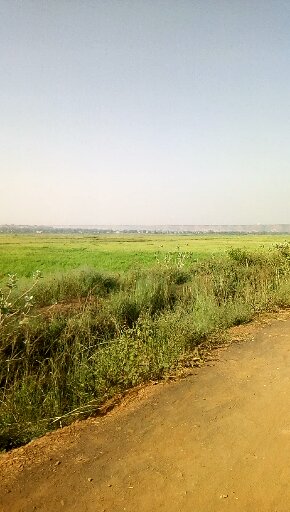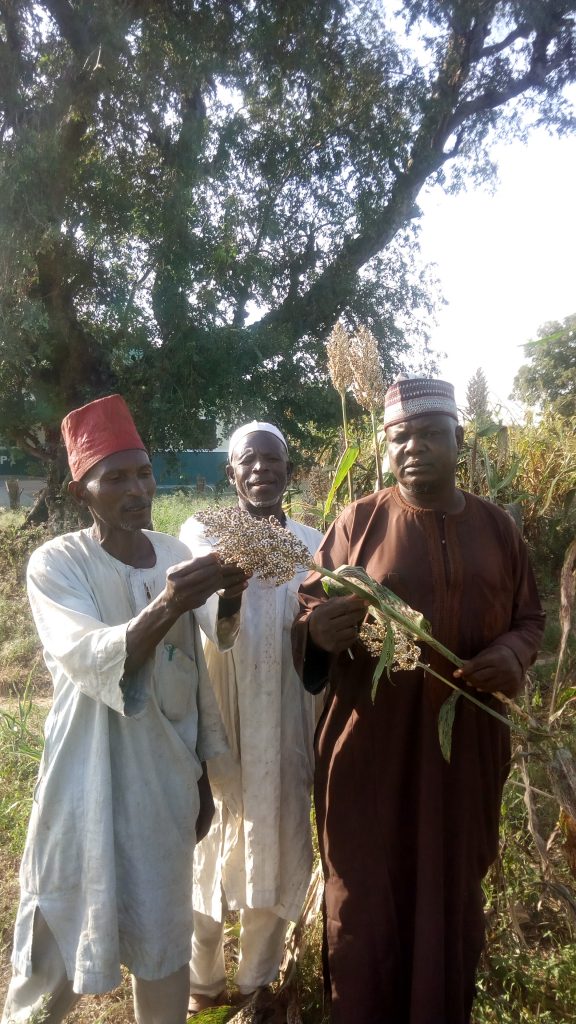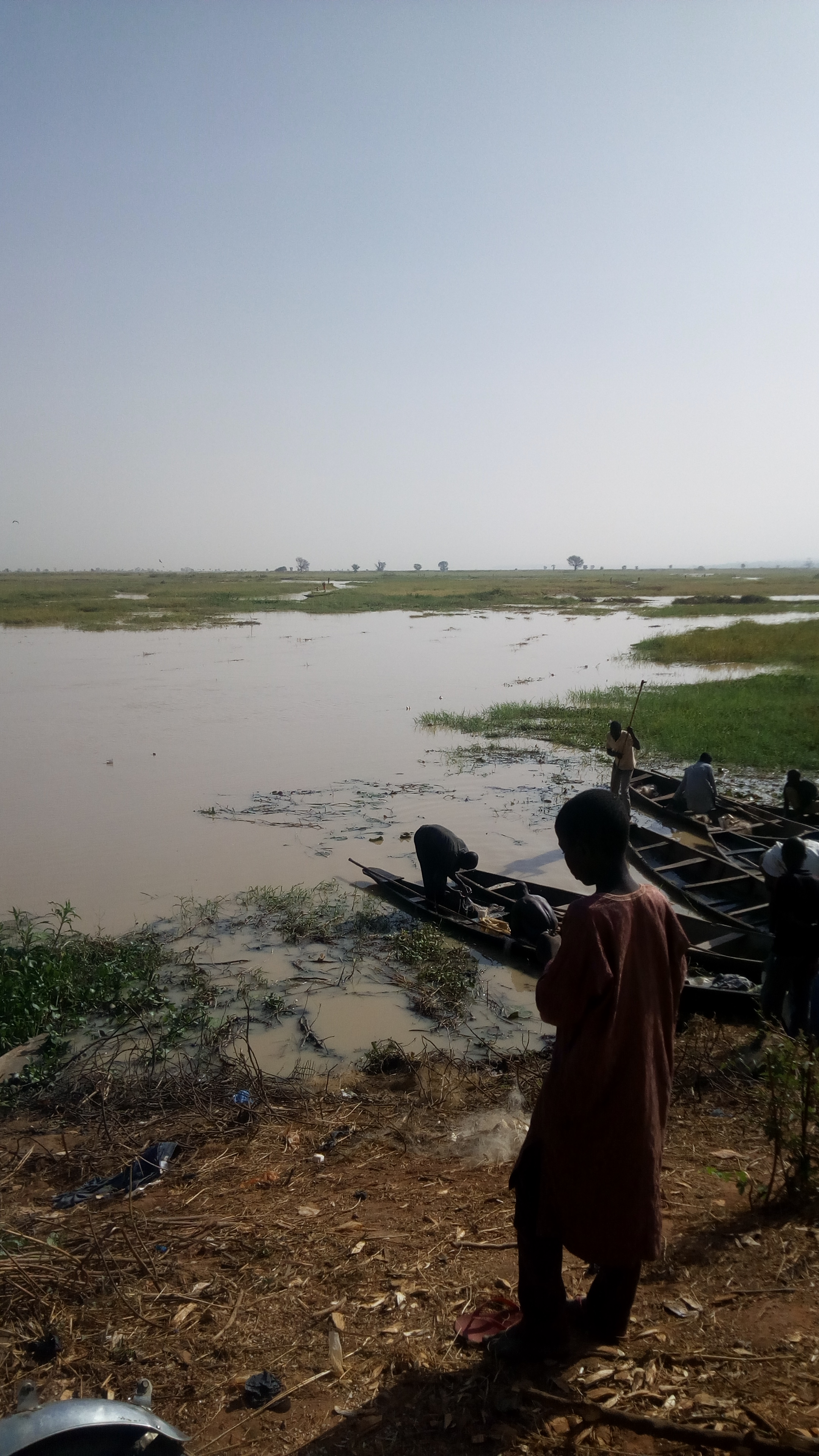As of September 24, 2018 the Niger River at Lokoja had fallen slightly from previous levels and stood at 11.05 meters.
Heavy rain from around August 27th, 2018 caused flooding in Jigawa, and Kano States, while on August 30th, 2018, communities in Kebbi State came under severe flooding. The Director General, National Emergency Management Agency [NEMA] Mustapha Maihaja in his remark acknowledged that flooding had displaced over two million people, 199 lost their lives and 307,554 hectares of farmland.
It all started like another day, August 15th, 2018, Tuesday morning, Alhaji Kabiru Mohammed a rice farmer in Suru, Suru Local Government Area, Kebbi State [80 kilometers and about 1 hour and 10 minutes drive from Birnin-Kebbi the state capital] prepared for his farm across River Rima on getting to the bank of River Rima, “It was like Noah’s flood, I couldn’t believe my eyes.
I kept asking myself, is this real or sci-fi?” Alhaji Kabiru Mohammed’s entire 20 hectares of rice farm has been completely submerged in the ‘rage of nature’ flood that engulfed the entire Suru community and it’s neighboring towns of Dakingari and Jega.
Echoing Alhaji Kabiru Mohammed is another farmer Alhaji Bala Kamba. Suru is a strategic rice producing community and headquarter of Suru Local Government Area of Kebbi State alongside Argungu, Birnin-Kebbi, Sabon Tunga, Giro, Kawara, Aljanare, Nasarawa, Tsamiya, Dugu Tshoho, Bunza, Baburu, Kankure, Sangelu, Dakingari, Jega, Dole Kaina [the worst flood hit rice producing local communities in Kebbi State], while; Bagudo, Bunza, Dandi, Jega, Shanga, Yauri and Ngaski [are the worst flood hit rice producing local government areas in Kebbi State].

At Zauro Polder, a rice farmland located in Birnin Kebbi the entire rice farm has been submerged in flood, the entire 100 hectares of rice farm is still under water as the time of filing this report. Zauro Polder is an irrigation project of Sokoto Rima River Basin Development Authority but has been abandoned and left to rot.
The pumping station at Zauro Polder Irrigation Project has gone atrophied and has been submerged. Alhaji Atiku Abubakar a rice farmer and Aliyu Abubakar said they have lost their entire life savings to the flood that came calling on August 15th, 2018.
The duo said they both borrowed money to purchased seedlings, fertilizer and inputs to nurtured their paddies. But lost everything to the flood and they now worked as labourers for other farmers in other to be able them to repay their debts and feed their families.
Jega, Bunza and Baburu wetland was completely flooded and farmers are still counting their loses in millions. In the popular Suru Rice market, farmers that brought their paddy harvest, said some of them harvested it before the flood came calling and are now forced to sell the products at N8,000 per bag to middle men in other to be able to pay back the money they borrowed from bank and association.
Kebbi State access N22 billion from Anchor Borrowers Programme [ABP] and majority of the farmers said, the money did not go to the real farmers. The farmers said they were asked to fill forms and requested to submit their bank details where the said money will be paid into, but majority of the couldn’t access the loans and blame Rice Farmers Association of Nigeria [RIFAN] executives for not doing enough as regards their plights as they were given farming inputs when they had already planted their crops and it is after post-planting they eventually received such items and this does not served their interests.
Most of the farmers said they access Anchor Borrowers Programme [ABP] since 2 years ago and seeds and fertilizers are given to farmers in December.
The Presidential Monitoring Team [PMT] of Anchor Borrowers Programme [ABP] that is responsible for success of Anchor Borrowers Programme [ABP] has not lived up to it’s objectives as members of Presidential Monitoring Team [PMT] are being accused by farmers of partisanship. It was learnt Presidential Monitoring Team disburses Anchor Borrowers Programme’s money to politicians, political office holders, relatives and association executives depriving the farmers the much needed fund and incentives.

The worst and most affected flood communities in Kebbi State stretches from; Birnin-Kebbi – Zauro Polder – Kankare – Suru – Argungu – Bunza – Baburu – River Rima. Jega – River Zamfara. Dole Kaina – River Niger which stretches to; Bagudu, Shanga [where Dangote Rice Mill is located], Yauri and Ngaski.
Farmers across Kebbi State complained of lack of assistance from both the state and federal government and said some officials came from Abuja and the state and collected their names, photos and farm variations and were asked to fill forms, but up till now they have not heard nor received anything to help them cushion the effect of the flood destruction of their farmlands in the ‘rage of nature’ deluge that ravaged their farmlands.
Farmers across the state however praised the efforts of Agriculture Transformation Agenda Support Program – Phase 1 [ATASP -P1] and AfricaRice Project and prayed NEMA, SEMA and Federal government to reached them through ATASP & AfricaRice in eventual assistance to them, because these NGO’s reached the innermost communities and are farmers friendly and supplied them with improved seed varieties, which had significantly improved their post-harvest.
Dr Phillip, The National Cereal Research Institute [NCRI], Birnin-Kebbi Outstation Manager said, “the flood wiped away everything the farmers had laboured for in the 2018 wet season rice farming and except the farmers are assisted, it will be difficult for some of them to recover from the loses they incurred.”
Also, Yahuza Garuba Illo, an Agribusiness Specialist with Agricultural Transformation Agenda Support Proramme – Phase 1, Birnin-Kebbi [Agricultural Transformation Agenda Support Programme – Phase 1 is a programmed designed by Nigeria in collaboration with African Development Bank [AfDB] to holistically approach the challenges confronting agriculture in Nigeria. It was mooted in 2013 by the then Minister for Agriculture and Rural Development, Dr. Femi Adesina the current President of African Development Bank [AfDB]. Agricultural Transformation Agenda Support Programme – Phase 1 [ATASP – P1] commence operation in 2015 with an initial take-off grant of $189 million from African Development Bank [AfDB].
The programme is on going in 33 local government areas in seven states of the federation namely; Anambra, Enugu, Niger, Jigawa, Kano, Kebbi and Sokoto States with a land area of 194,426 kilometers and a population of 32,121,944 people and 45,000 farmers benefiting] said, “Words can’t just described the 2018 deluge witnessed in Kebbi State, it is simply catastrophic.”
A soldier and nine other people were reportedly killed by the deluge that hit Kebbi State according Abubakar Dakingari, Chief Press Secretary to Kebbi State Governor, Alhjai Atiku Bagudu. Kebbi State Emergency Management Agency chairman, Alhaji Sanni Dododo said Kebbi State Emergency Management Agency [SEMA] is in the process of capturing all the farmers that were affected by the flood in Kebbi State.
Also speaking in an interview, Kebbi State Chairman of Rice Farmers Association of Nigeria [RIFAN], Alhaji Sahabi Augie described the flood as a disaster and a setback for rice production activities in the state. He also said, 37,610 hectares of rice farmlands was destroyed with about 1,000 farmers that benefited from Anchor Borrowers Programme [ABP] in Kebbi State.
Alhaji Sahabi Augie also said that farmers in the lowland areas lost 100 percent of their crops, while farmers in the upland areas lost 40 percent of their crops to the flood in Kebbi State and said Kebbi State rice farmers and members of Kebbi State chapter of Rice Farmers Association of Nigeria [RIFAN] has not received any form of assistance from any body to cushion the effects of the flood.
25,950 people lost their farms, 5,495 homes were destroyed in Kebbi State according to the official release by the National Emergency Management Agency [NEMA], Abuja.
In Kano State the 2018 flood deluge displaced over 30,000 farmers in 17 local government areas of the state. Most of the farms affected were wet season farmers and about 60,000 farmers across the 44 local government councils of Kano State.
The cost of production for wet season rice production is put at 203,000 naira per hectare and 219,000 naira per hectare for dry season farming production. In a brief interview session with Chairman of All Farmers Association of Nigeria [AFAN], Kano State Chapter at Farm Center, Kano City which includes all the 44 local government areas chapters chairmen of Kano State.
The Kano State All Farmers Association of Nigeria [AFAN] Chairman, Alhaji Abubakar Haruna Illiya said, “Kano State AFAN executives were invited to Abuja and a meeting was held with a team from Central Bank of Nigeria [CBN], National Agricultural Insurance Corporation [NAIC], Unity Bank, and National Emergency Management Agency [NEMA] and all the farmers data that were affected by the flood in Kano State were captured, but up-til now the farmers has not being reached.”
From Ajingi – Wudil – Warawa – Gafan-Zanya – Bunkure – Karaye – Dogwa in Kano State all the farmers had a sad story to tell as regards the 2018 flood that came and ravaged the entire communities and farmlands. The Hadejia Jama’are River Basin Development Authority [HJRBDA] Kano Irrigation Project at Bunkure has caved in. From Bunkure irrigation project all along to Gafan Zanya farming community, the connecting canals has collapsed together with the dykes.
In Jigawa State, the flood worst hit local government area was Auyo Local Government Area. The communities that were seriously involved in the 2018 catastrophic flooding includes: Auyo, Jura, Kataije, Galadimawa, Zaburau, Kalgwai, Dunari, Ayama, Tsidir, Mallam Madori and Rigar Isa. These communities were submerged under the’ rage of nature’ flood.
The Chairman of Auyo Local Government Area, Jigawa State, Alhaji Musa Kalgwai said, “6,500 hectares of farmlands were swept away by the catastrophic flooding that ravage the local government”.
Most of the crops affected in the flood according to Alhaji Musa Kalgwai, includes; rice, millet and sorghum. With 3 people dead and an estimated 300 houses and 700 animals and valuables swept away by the flood in the ‘rage of nature’.
Despite assurances and visits by National Emergency Management Agency [NEMA] & State Emergency Management Agency [SEMA] officials, the affected farmers had not received anything from the these two agencies nor the state government.
Auyo Local Government Area, Jigawa State is still submerged as the time of filing this report with most of the entire communities across the governates still lives on water as they waits for the flood to recede. Also Ringim, Jahun, Taura, Hadejia Guri and Miga local government areas had a bitter experience to tell about the 2018 catastrophic flood deluge.
Most of the affected farmers sleeps in the open fields with little or nothing and are at the risk of infections. They also cried out to various relief agencies and government to come to their aid to help cushion the effect of the ‘rage of nature’. Alhaji Samaila Kurmi said, “I lost everything; my goats, my fields, my homes and I lost two of my family members. I’m yet to come to my senses.”
The question most of the farmers are asking is when will the relief materials and incentives promised them by the government arrived? As the farmers hope and fate hangs in the balance. To them they will never, never, never become what they were before the flood came calling again. It is situation they will never forget and a story that will tell the future generations of what it becomes of them.
Taiwo Lawrence Adeyemi.
Research & Data Analyst, Premium Times Center for Investigative Journalism [PTCIJ].
Mobiles: +234.816.950.3218, +234.701.224.8573.
Twitter: @Taiwo387

